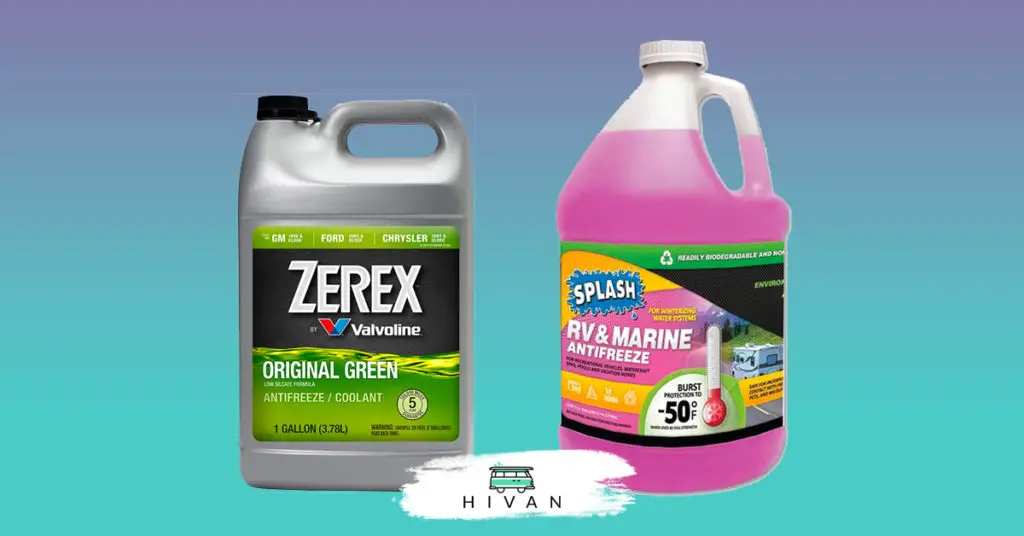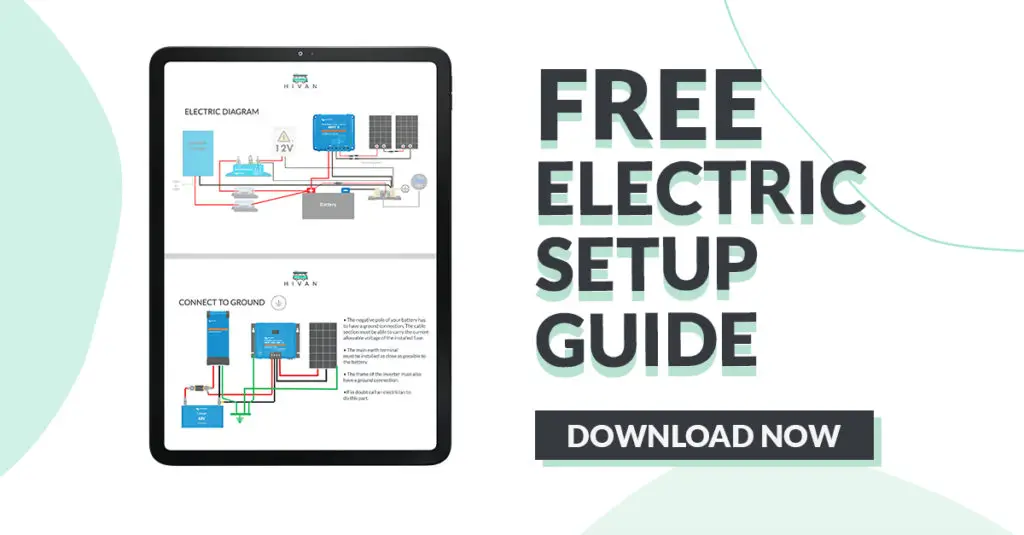Hi-van is supported by its audience. When you purchase using our links, we may earn an affiliate commission (no added cost to you). Learn more
If you’re a new RV owner, you’ve probably been told you’ll need to winterize your vehicle ahead of cold weather by draining its water lines and adding RV antifreeze to the system. Perhaps you’ve wondered if you actually need to buy a special product. Is there really any difference between regular and RV antifreeze?

Regular and RV antifreeze differ in two ways.
- Regular antifreeze is meant for use in engines only and contains ethylene glycol, which is highly toxic and can be fatal if ingested.
- Most RV antifreeze is made of propylene glycol, which is non-toxic and safe for use in your RV’s water lines.
Regular, or automotive, antifreeze is extremely poisonous. Using it in your RV can contaminate the entire water system, requiring extensive cleaning or even total replacement to avoid potentially hazardous exposure. Read on for more about why.
Automotive or “Regular” Antifreeze

Traditionally made of ethylene glycol (a member of the alcohol family), the substance typically referred to as “antifreeze” actually serves multiple purposes, some of them not related to preventing freezing.
Like other alcohols, ethylene glycol has a much lower freezing point than water, which is why it is known as “antifreeze.” It does an excellent job of preventing liquid within an engine from freezing in very cold weather.
Surprisingly, however, ethylene glycol also has a much higher boiling point than water.
Used in an engine, it serves as an all-purpose temperature regulator, preventing not only freezing but also overheating. Additionally, ethylene glycol is naturally viscous, giving it lubricating and anti-corrosive properties.
Unfortunately, it is also highly toxic, with a naturally sweet taste, which has led to numerous poisonings of both people and pets since it was first synthesized in the mid-1800s.
Ingesting as little as two tablespoons of ethylene glycol can kill an adult.
After multiple attempts at legislation, in 2013, ethylene glycol antifreeze manufacturers in the United States voluntarily agreed to add a bitter-tasting agent to their products in an effort to decrease incidents of accidental poisoning.
However, this does not render the product less toxic.
Seek medical attention at once if you suspect that you or someone around you has swallowed any quantity of antifreeze.
Given such a high degree of toxicity, it should be obvious why you can’t use regular antifreeze in your RV’s open water lines. Lines that deliver water for drinking, cooking, or washing could be easily contaminated, leading to accidental poisoning if they aren’t thoroughly flushed and cleaned before being used.
Though propylene glycol-based antifreeze has become available for automobiles in recent years, ethylene glycol-based formulas remain the most common.
Find this content useful 🙂 ?
Subscribe to our Newsletter and get a free Solar Electric Diagram + shopping list.
RV Antifreeze
There are several varieties of antifreeze that can be used in RVs, each with its own set of pros and cons. Let’s take a closer look at them now.
Ethanol RV Antifreeze
RV antifreeze made from ethanol, the same type of alcohol found in alcoholic beverages, is a popular option. It is inexpensive and readily available at many hardware stores.
Though it remains toxic in large quantities, it lacks the sweet taste of ethylene glycol, so it is unlikely to be accidentally ingested.
If it is not thoroughly flushed from the system in the spring, ethanol antifreeze may leave your water tasting bad, though it isn’t dangerous.
Additionally, because alcohol is very drying, ethanol antifreeze can degrade the rubber seals in your RV’s water system. It may leave you with leaks to track down and repair when you’re ready to get on the road again.
Finally, ethanol is highly flammable.
Avoid using ethanol antifreeze near pilot lights or other sources of flame, and be aware that ethanol vapor can also catch fire. Make sure you are in a well-ventilated area if flushing your RV’s water system with ethanol antifreeze.
Unfortunately, this type of anti-freeze is difficult to find, so you won’t have much luck if you want to buy this type for your RV.
Propylene Glycol RV Antifreeze
Propylene glycol is a synthetic substance belonging to the same chemical group as alcohol. It is an odorless, colorless, near-tasteless liquid with a syrupy texture slightly thicker than water, and it’s approved for a variety of uses, including as a food additive.
Its long-established safety profile and high freeze resistance make it the ideal antifreeze agent for use in RV plumbing, which won’t taint your water or hurt your plumbing.
It’s also easy to use and comes in multiple strengths for use at different temperatures. It is, however, more expensive than other types of RV antifreeze.
Additionally, if you are using propylene glycol antifreeze, it is important to make sure it is made from new or “virgin” propylene glycol. Because there is high demand for the chemical and because it’s used in so many other applications, there is a market for recycled propylene glycol.
Recycled material, while acceptable for some purposes, can contain contaminants that could damage your RV’s water systems.

If you’re looking for a great propylene glycol antifreeze, check out the Splash RV/Marine Antifreeze, which is available from Amazon.com. It can be used in all-terrain vehicles and marine craft, as well as other vehicles you might own, and protects to temperatures as low as -50℉ (-45.56℃).
Propylene/Ethanol Blend RV Antifreeze
RV antifreeze made from a blend of propylene and ethanol attempts to split the difference between the two other types. It is less expensive than pure propylene glycol antifreeze, but it retains many of the downsides of ethanol-based formulas.
Problems with bad-tasting water and degraded rubber seals are still commonly reported by users.
As with the ethanol-only antifreeze, the propylene/ethanol blend antifreeze is rare, so if your RV requires this type, you may want to check with specialty shops online or with the dealer where you bought your RV. Fortunately, however, most RVs use propylene glycol antifreeze.
Can You Use RV Antifreeze in a Car?
Depending on the size of your RV’s water system and the amount of antifreeze you purchased, you may have a leftover product. We’ve established that you can’t use regular antifreeze in your RV, but can you use the leftover RV antifreeze in your car?
You cannot use RV antifreeze in your car engine. RV antifreeze, because it is intended for use in water systems, not engines, lacks the cooling capacity of automotive antifreeze. Putting RV antifreeze in an automobile engine will result in the engine rapidly overheating and potentially warping.
Final Thoughts
Since both products are generally referred to as “antifreeze,” it’s easy to understand why someone would assume that automotive antifreeze and RV antifreeze are basically the same.
Given the enormous differences in their level of toxicity and their intended use, however, it’s vital for RV owners not to make the mistake of thinking they are interchangeable.

